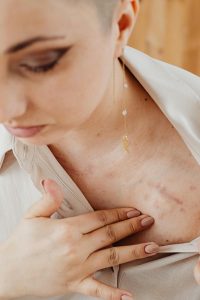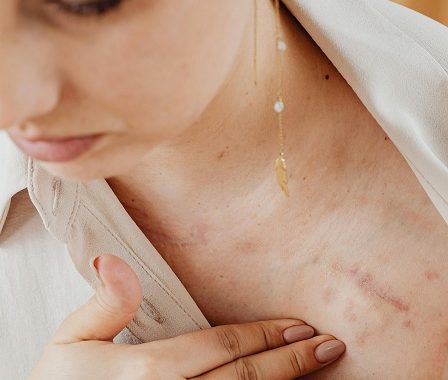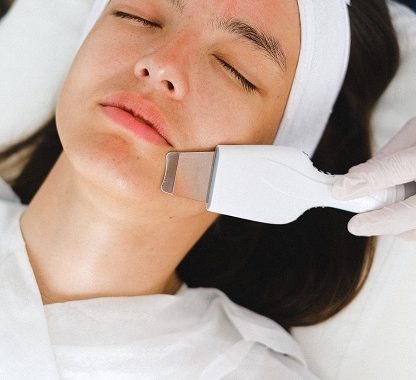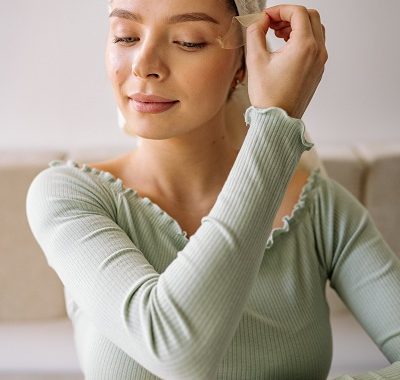
Acne, a common skin condition affecting millions worldwide, can be a persistent and frustrating concern for many. While its causes are multifaceted, understanding how to keep the skin clear of acne is a quest pursued by countless individuals.
Beyond the plethora of skincare products promising miraculous results, there are fundamental practices and habits that play a pivotal role in maintaining clear, acne-free skin.
Let’s delve into the intricacies of skincare routines, dietary choices, and lifestyle factors that contribute to achieving a radiant, blemish-free complexion.
Consistent Skincare Regimen:
Establishing a consistent skincare routine tailored to your skin type is paramount in warding off acne. This regimen typically involves cleansing, toning, moisturizing, and targeted treatments.
Cleansing twice daily removes dirt, oil, and impurities, preventing clogged pores—a precursor to acne formation. Incorporating gentle, non-comedogenic products helps maintain the skin’s natural balance without exacerbating acne.
Regular Exfoliation:
Regular exfoliation is a crucial step in any skincare routine as it helps remove dead skin cells, preventing pore blockages that can trigger acne. Yet, it’s vital to strike a balance, as over-exfoliation can disrupt the skin’s natural barrier, worsening acne.
Choose gentle exfoliants with ingredients like salicylic acid or AHAs, which effectively promote cell turnover without causing irritation.
These ingredients penetrate the skin to dissolve debris within pores, ensuring a clearer complexion while minimizing the risk of inflammation.
Incorporating exfoliation into your skincare regimen 1-3 times per week, depending on your skin’s sensitivity, can effectively prevent acne breakouts without compromising skin health.
Hydration:
Hydration plays a pivotal role in maintaining skin health and preventing acne. Adequate hydration ensures the skin’s natural barrier function remains intact, preventing moisture loss and maintaining optimal hydration levels.
Despite common misconceptions, moisturizing oily or acne-prone skin is essential. Dehydration can lead to a compensatory increase in oil production, exacerbating acne. Lightweight, oil-free moisturizers are ideal for such skin types, as they provide hydration without clogging pores or weighing down the skin.
Formulations containing ingredients like hyaluronic acid are particularly beneficial, as they possess humectant properties that attract and retain moisture within the skin.
By incorporating a hydrating moisturizer into your skincare routine, you can help balance oil production, prevent dehydration, and maintain a healthy, clear complexion.
Best acne scar removal products
Targeted Treatments:
Targeted treatments, such as benzoyl peroxide, salicylic acid, and retinoids, are potent allies in the battle against acne.
Benzoyl peroxide, known for its antibacterial properties, penetrates deep into the pores to eliminate acne-causing bacteria, thereby reducing inflammation and preventing future breakouts.
Salicylic acid, a beta hydroxy acid (BHA), exfoliates the skin’s surface and penetrates into the pores to remove excess oil and dead skin cells, effectively preventing pore blockages. It also possesses anti-inflammatory properties, reducing redness and swelling associated with acne.
Retinoids, derived from vitamin A, regulate cell turnover, preventing the accumulation of dead skin cells and promoting the growth of new, healthy skin cells. Additionally, retinoids help unclog pores and reduce the formation of comedones (clogged pores), making them an effective treatment for acne.
By targeting multiple aspects of acne formation, including excess oil production, inflammation, and pore blockages, these ingredients work synergistically to keep acne at bay and promote clear, healthy skin.
Best acne scar removal products
Dietary Considerations:
Diet plays a significant role in skin health, although the exact impact varies among individuals. Opting for a balanced diet abundant in fruits, vegetables, whole grains, and lean proteins provides essential vitamins, minerals, and antioxidants crucial for maintaining skin health.
These nutrient-rich foods promote collagen production, support skin regeneration, and combat inflammation, contributing to a clear complexion.
Conversely, processed foods, high-glycemic-index carbohydrates, and sugary treats can spike blood sugar levels, triggering hormonal fluctuations that exacerbate acne.
Moreover, dairy products, particularly those high in hormones and saturated fats, have been linked to increased acne severity in some individuals due to their potential to stimulate excess sebum production and inflammation.
By prioritizing whole, nutrient-dense foods and minimizing the consumption of acne-aggravating culprits, individuals can optimize their dietary choices to support clear, radiant skin.
Skin Care (60 mg Vitamin C) Halal Vegan Gelatin Free Capsules
Stress Management:
Stress management plays a pivotal role in maintaining clear, acne-free skin. When the body experiences stress, it releases hormones like cortisol, which can trigger hormonal imbalances known to exacerbate acne.
Moreover, stress stimulates the production of sebum, the oily substance that can clog pores and lead to breakouts. To counteract these effects, incorporating stress-reduction techniques into your daily routine is essential.
Mindfulness practices, such as deep breathing exercises and staying present in the moment, can help alleviate stress and promote a sense of calm.
Meditation, which involves quieting the mind and focusing on breath or a specific mantra, has been shown to reduce cortisol levels and alleviate the physiological effects of stress.
Similarly, yoga combines movement with breath, providing both physical and mental relaxation, making it an effective stress-relief tool for improving skin health.
Engaging in hobbies or activities that bring joy and relaxation can also significantly reduce stress levels.
Whether it’s painting, gardening, or playing a musical instrument, finding time for activities you enjoy can distract from daily stressors and promote feelings of well-being.
Furthermore, prioritizing adequate sleep is crucial for both mental and physical health. During sleep, the body undergoes essential repair processes, including skin regeneration.
Lack of sleep can disrupt these processes, leading to increased inflammation and worsening of acne. Establishing a regular sleep schedule and practicing relaxation techniques before bedtime, such as reading or taking a warm bath, can improve sleep quality and support overall skin health.
Incorporating relaxation techniques and stress management strategies into your daily routine not only benefits your mental well-being but also promotes clear, healthy skin.
By prioritizing self-care and adopting healthy coping mechanisms, you can effectively mitigate the effects of stress on skin health and maintain a radiant, blemish-free complexion.
The Relaxation and Stress Reduction Workbook
Sun Protection:
Sun exposure has a paradoxical relationship with acne. Initially, sunlight can appear to improve acne by drying out excess oil and temporarily reducing inflammation.
However, prolonged exposure to UV radiation can lead to a host of negative effects on the skin, exacerbating acne in the long run. UV rays can stimulate the production of sebum, the skin’s natural oil, which can clog pores and contribute to acne formation.
Furthermore, UV exposure triggers the production of free radicals, which can damage skin cells and exacerbate inflammation, leading to more severe breakouts.
Moreover, individuals with acne-prone skin are often left with post-inflammatory hyperpigmentation (PIH) as a result of acne lesions. This occurs when the skin produces excess melanin in response to inflammation, leaving behind dark spots or patches long after the acne has healed.
Prolonged sun exposure can exacerbate this pigmentation, making PIH more pronounced and difficult to fade.
Incorporating a broad-spectrum sunscreen into your daily skincare routine is essential for protecting the skin from the harmful effects of UV radiation.
Broad-spectrum sunscreens provide protection against both UVA and UVB rays, which are responsible for causing skin damage, premature aging, and skin cancer.
By applying sunscreen regularly, you create a barrier that shields the skin from UV rays, preventing them from penetrating the skin’s layers and triggering acne flare-ups.
Furthermore, sunscreen helps prevent post-inflammatory hyperpigmentation by protecting the skin from UV-induced inflammation.
By minimizing inflammation, sunscreen reduces the risk of dark spots and uneven skin tone, allowing acne-prone individuals to achieve a clearer complexion over time. When selecting a sunscreen, opt for oil-free or non-comedogenic formulas to avoid clogging pores and exacerbating acne.
Additionally, choose a sunscreen with an SPF of 30 or higher and reapply it every two hours, especially when spending extended periods outdoors. By prioritizing sun protection, individuals can safeguard their skin from the harmful effects of UV radiation and maintain a clear, healthy complexion.
Conclusion:
Achieving and maintaining clear, acne-free skin requires a multifaceted approach that encompasses consistent skincare practices, dietary considerations, lifestyle modifications, and stress management techniques.
By adopting a holistic approach to skincare and embracing healthy habits, individuals can empower themselves to effectively combat acne and unveil a radiant, blemish-free complexion.
Remember, what keeps skin clear of acne is not merely about the products you apply but also the lifestyle choices you make to nurture your skin from within.
Further Reading:
6 skin care habits that can clear acne
FAQs:
What makes acne clear up?
Acne clears up as a result of reduced inflammation, decreased oil production, and accelerated shedding of dead skin cells. Treatments such as benzoyl peroxide, salicylic acid, and retinoids unclog pores, kill acne-causing bacteria, and promote cell turnover. Additionally, lifestyle factors like stress management, a balanced diet, and proper skincare play crucial roles in acne resolution. Ultimately, clear skin is achieved through a combination of targeted treatments, healthy habits, and consistent skincare routines.
How can I make my skin clear and acne free?
To achieve clear, acne-free skin, establish a consistent skincare routine tailored to your skin type, including cleansing, exfoliating, moisturizing, and targeted treatments with ingredients like salicylic acid or benzoyl peroxide. Maintain a balanced diet rich in fruits, vegetables, and lean proteins while limiting processed foods and dairy, which can exacerbate acne. Practice stress management techniques like meditation or yoga to reduce hormonal fluctuations. Always use a broad-spectrum sunscreen to protect against UV radiation and prevent post-inflammatory hyperpigmentation.
How do you finally clear acne?
To finally clear acne, establish a consistent skincare routine tailored to your skin type, incorporating gentle cleansers, targeted treatments (like benzoyl peroxide or salicylic acid), and oil-free moisturizers. Regular exfoliation helps remove dead skin cells, while staying hydrated and managing stress levels are crucial. Additionally, consider dietary adjustments, such as reducing sugar and dairy intake. Lastly, protect your skin from harmful UV rays with broad-spectrum sunscreen. Consistency and patience are key to achieving and maintaining clear skin.
How do I stop getting acne permanently?
To stop getting acne permanently, maintain a consistent skincare routine tailored to your skin type, including cleansing, exfoliating, and moisturizing. Incorporate targeted acne treatments with ingredients like salicylic acid or benzoyl peroxide. Maintain a balanced diet rich in fruits, vegetables, and lean proteins while limiting sugary and processed foods. Manage stress through relaxation techniques like meditation or yoga. Avoid picking or squeezing acne lesions to prevent scarring. Protect your skin from sun damage by using a broad-spectrum sunscreen daily. Consistency in these practices is key to achieving long-term acne prevention.




Pingback: 6 Skin Care Habits for Clearing Acne - Acnes derma relief